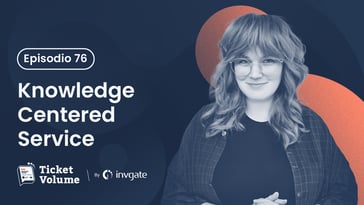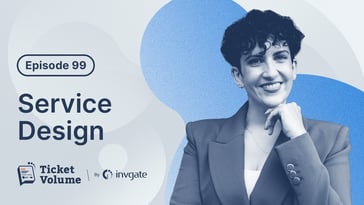There is certainly a lot of noise to filter in the Customer Experience (CX). But, when you learn how to listen to what is happening around you, it’s easier to track down where management can meet people’s needs and how to implement the right solutions. Needless to say, advocating for excellence and quality in Service Management is the way to go.
Kevin Clark took us to where good service comes from on the 7th episode of Ticket Volume, our IT podcast. His career started with customer service roles, which taught him valuable lessons applicable to various fields. Then he took a break for an around-the-world tour before transitioning to consulting. He provides advice for those moving from an internal IT role to consulting. Now, he has spent almost 20 years in IT Services.
Clark explained it’s all about combining existing knowledge which leads to building something greater than before. And within IT, it’s a juggling act between different proven methodologies and the IT Service Management (ITSM) systems available.
So, continue reading for a brief written summary of the episode about people, processes, and tools! And, on that note, remember that you can register for our monthly live recordings and ask your questions live!

Look for lessons everywhere to implement a good service
Lessons come from everywhere when it comes to implementing a good ITSM solution because if you have a customer service background you can use that muscle from when you were waiting tables to any role in IT, especially when trying to understand what people need, not just what they ask for.
|
|
"As a bartender, you have a lot of that trying to understand what people are really looking for in their experience, as opposed to what they’ve might asked for or what they’ve might seen on the menu. So, not everything that can you give to someone is necessarily going to be on the menu, as they say." Kevin Clark |
The challenge here is to present them with something that can benefit them based on your experience while applying some form of reversed engineering.
He explained it comes down to acknowledgment. Service desk experience teaches logical thinking and problem-solving skills. For instance, in Clark’s experience, communication struggles arise when trying to implement IT practices across different departments within an organization.
Although it is true there has been progress made in Enterprise Service Management (ESM) thanks to the ITIL principles, and that IT teams have a good understanding of ticket flows, processes, and categorization, it can be challenging to explain these concepts to other parts of the business.
But, once you tackle this barrier, it becomes easy to understand the customers' true needs. Hence, we consider three takeaways from their insightful discussion that can help you pin the methods and tools used to deliver good services.
1. Using ITIL practices for process improvement
Clark is of the opinion that some people may dislike ITIL, but he believes it serves as a valuable framework for process improvement. While not every aspect of ITIL works universally, there are always lessons to be learned from its principles.
He suggested using ITIL as a guidance framework rather than a strict blueprint, so organizations can benefit from tried and true practices. Small details learned from ITIL can be applied effectively in various industries outside of traditional IT service management.
The truth is there is value in understanding and implementing proven methodologies. As an example, simulations like the Apollo one demonstrate how adding a database or following specific workflows can improve productivity.
|
|
"As an ex-bartender, I would in my mind - as a mental exercise - design a bar according to ITIL principles. What are the Change Management ramifications of making drinks and how does a service catalog relate to a drinks menu, and how you would set our your configuration, how would you set out your bar, the back bar and things like. So I used that to make a lot of those things more relevant to my experience. And I used to use that in consulting as well. That helps get a lot of cut-through with people who maybe hadn’t had much experience or done much training in the ITIL realm." Kevin Clark |
2. ITSM tools are a great solution
Clark reflected on his experience with different ITSM tools, starting with BMC Remedy and HP Service Desk. He highlighted the power of workflow-based engines, business rules, and robust databases in these systems.
He also delved into his early career experiences with systems like Novell NetWare and Lotus Notes. On the one hand, Novell NetWare was used for infrastructure management, file systems, accounts, and permissions. On the other hand, Lotus Notes was a monolithic system similar to ServiceNow, functioning as a database engine with various tools on top.
3 The value of constraints in the platforms and systems available
Having multiple platform options can be both great and terrible for businesses. We could build applications on these platforms but face challenges when the original builders moved on while the application remained. That is the problem of maintaining applications built by clever people who move on. It’s not new! But, the incredible features of the database forms engine and the availability of various platforms like Microsoft PowerApps, InvGate Service Management, ServiceNow, and Salesforce are still worth it.
Choosing the right platform requires good architecture and a solid plan for utilization. It's crucial to keep an eye on maintainability and support when building systems on powerful platforms.
Good documentation, control, governance, and flexibility are essential for growth without failure, even if it comes with constraints. But, you have to be careful whatsoever since buying a system from a vendor without the option to change anything can be limiting. So, go ahead and choose constraints while making explicit decisions about bending rules. For example, Beran pointed out you could select tools with open APIs and the ability to connect with competitor's tools. It gives you flexibility but requires careful management.
The bottom line
This recap only scratches the surface of the 7th episode of Ticket Volume with Kevin Clark. If you want to dive deeper, make sure to catch the full chat with InvGate Product Specialist Matt Beran. They shared valuable insights on where good service comes from and so much more along the lines of ITSM.
You can catch the full episode on platforms like Apple Podcasts, Spotify, YouTube, or your favorite podcast platform. And don't forget to register to stay in the loop and get updates about the monthly live recordings!















